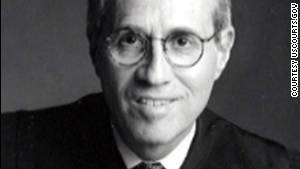Militants: Somali-American bombed AU base
A team of suicide bombers and gunmen disguised as soldiers assaulted an African Union base in the Somali capital on Saturday, sparking a two-hour gunfight that left at least 10 people dead, security officials said. The al-Qaida-linked Islamist militant group that claimed the attack said one of the bombers was Somali-American.
The attack underscored the militants' ability to carry out complex and deadly operations even after AU troops forced them from most of Mogadishu and a famine in their strongholds weakened their forces. Earlier this month, Kenya sent troops into Somalia following a string of cross-border attacks and kidnappings blamed on Somali gunmen and militants battling Somalia's weak, U.N.-backed government.
During Saturday's attack, the two suicide bombers blew themselves up near the entrance to the compound, then more armed attackers jumped over the walls, a Nairobi-based security official said. He asked for anonymity because he was not authorized to speak to the press.
The true extent of casualties from the assault was unclear, although a Somali soldier, Col. Nor Abdi, said at least 10 people were killed.
"They were dressed in Somali military uniform and disguised as ordinary soldiers," Abdi said. "Then they tried to enter the base and (AU) soldiers fired at them. Then heavy gunfire started and all of them were killed. I don't know how many they were but they were more than 10 men."
In a claim posted on Somalimemo.net, a website it frequently uses, al-Shabab militants said one of the bombers was a Somali-American and claimed he was the second Somali-American involved in a suicide attack in Mogadishu within five months. They did not name the youth or offer further details, and the claim could not immediately be independently verified.
U.S. authorities say that around 20 American citizens, most of Somali descent, have traveled to Somalia to fight with the al-Shabab insurgents. The most well-known among them is Omar Hammami from Alabama, known as Abu Mansur al-Amriki, who posts internet videos in which he raps about the conflict.
Al-Shabab claimed to have killed dozens of AU soldiers and government troops in Saturday's assault, but the group habitually exaggerates the number of people it kills and an AU statement did not mention casualty figures.
"With the access routes to the base cut off by other units of the Mujahideen, the Ugandan forces and (government) militia trapped inside the compound were soon massacred and all military arsenal and ammunitions seized. Some of the Ugandan soldiers who managed to escape the compound were later pursued and killed," the al-Shabab statement said.
It was written in perfect English, a sign of the growing sophistication of al-Shabab's media wing.
The AU statement said its forces had "beaten off" the attack. AU troops have been in Somalia since 2007. Some 9,000 AU soldiers are helping Somalia's government hang on to the capital.
Meanwhile, the chief of Kenya's armed forces, Gen. Julius Karangi, told reporters that the country does not have a timeframe for leaving Somalia.
"When the Kenya government and the people of this country feel that they are safe enough from the al-Shabab menace, we shall pull back," Karangi said. "Key success factors or indicators will be in the form of a highly degraded al-Shabab capacity."
His statement raised questions about whether Kenya risks becoming bogged down in an open-ended occupation of its war-ravaged neighbor. Both the U.N. and Ethiopia sent forces into Somalia at different times during its 20-year-old civil war but were forced to withdraw without ending the conflict.
Karangi said Kenya has no interest in permanently occupying Somalia and is working with its government. The Somali president has criticized the Kenyan intervention, but Kenyan officials said they expected "clarification" from a high-level Somali delegation on Monday.
So far Kenya has suffered one fatality due to al-Shabab fire, Karangi said, although five people were killed when their helicopter crashed. He said hundreds of al-Shabab were believed to be killed although he had no way of confirming that directly. Al-Shabab militants have mostly withdrawn without fighting Kenyan forces.
Although Kenya has bilateral military agreements with countries such as the United States and Britain, those allies are not directly militarily involved in the incursion into Somalia, Karangi said.
"There has been a lot of talk about other friends of ours participating militarily in what we are engaged in, and the answer is no," he said.
Somalia has not had a functioning government since warlords overthrew a socialist dictator in 1991. More than 600,000 Somali refugees have fled the fighting and famine in their homeland and now live in Kenya. The Kenyan government is deeply worried about the rapidly swelling refugee camps in the north, which it considers a severe security problem.
___
Houreld contributed to this report from Nairobi, Kenya.




